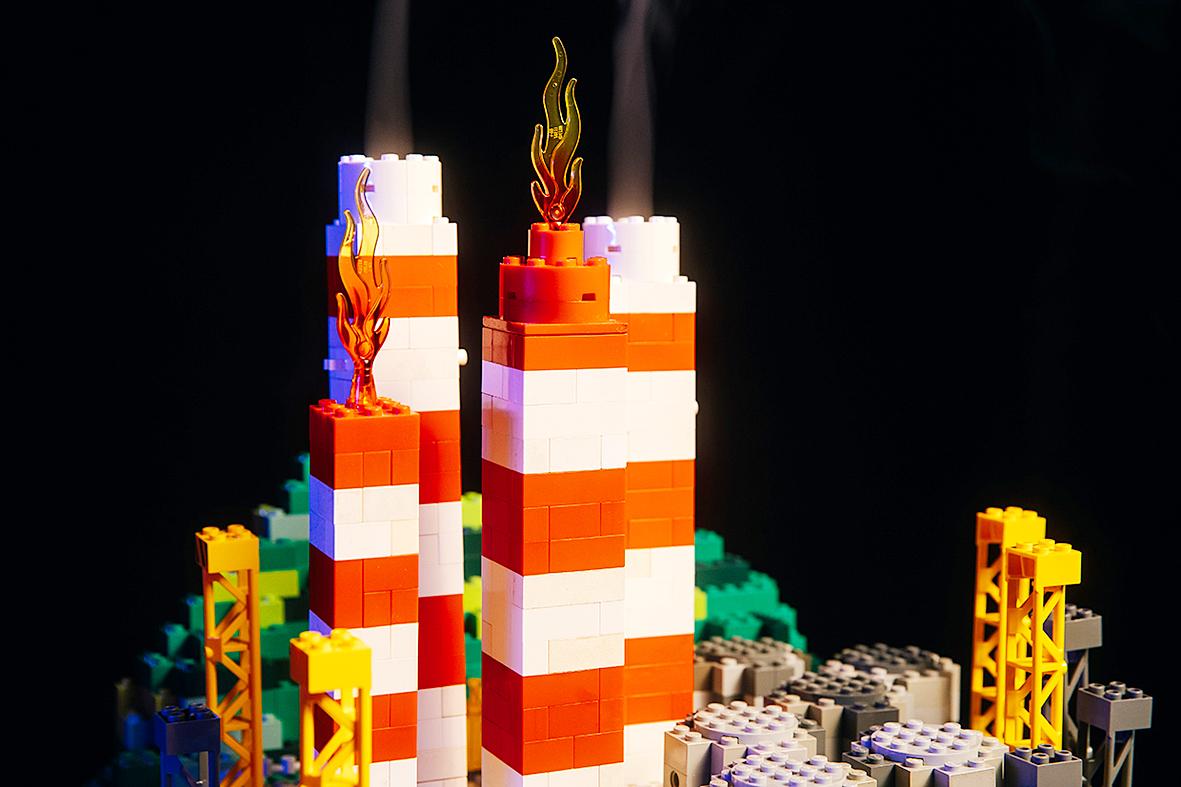In artist Tseng Yen-ting’s (曾彥婷) video Plastic Bowl, a cheery singer narrates a whimsical yet harrowing first-person life story of a plastic bowl: it takes 180 million years for a dead organism to fossilize and become natural gas or oil, 22 days to ship it to a factory, 96 hours to turn it into a disposable bowl, which is used for a mere 16 minutes at a temple banquet.
But that’s not the end.
The bowl breaks down into microplastics that remain in the ocean for thousands of years, and the tiny shards of plastic then watches as humanity leaves for outer space after presumably ruining Earth. The entire process is playfully animated using various found objects.

Photo courtesy of Tseng Yen-ting
“Everybody dies and I’m still on earth! Everybody leaves and I’m still on earth!” sings artist and songwriter Chiang Tao (蔣韜), who has been working with Tseng on petrochemical and plastic pollution-related projects in Taiwan since 2020 through Uncertain Studio (測不準工作室), which they co-founded.
The video shows one of four physical installations that make up Tseng’s latest project, The Collection of Time in the Polymer Age (在聚合世代採集時間), which explores the subjectivity of the scale of time through different topics related to Taiwan’s petrochemical industry.
Tseng became interested in this approach after reading Susan Freinkel’s Plastic: A Toxic Love Story and noticing how plastics have transformed humanity despite only being with us for a fraction of our existence.

Photo courtesy of Tseng Yen-ting
The Collection of Time in the Polymer Age is one of three projects featured by the newly-formed Magnify Art Collective, which invites creators from around the globe to highlight various social and environmental issues and contribute to the creation of new structures and solutions. The current focus is on plastic pollution, and as one of the world’s top petrochemical producers, Taiwan is an important country to focus on.
The project also promotes existing solutions such as zero-packaging stores and delivery giant Food Panda’s reusable container venture and looks at how government policy can be changed.
ART FOR CHANGE

Photo courtesy of Tseng Yen-ting
Specializing in object theater, Tseng says her earlier work was more poetic and focused less on social issues.
“Through performances, I became sensitive to different found objects and materials,” she says.
But after several residencies abroad, she began to explore the development of these materials in human history and how people generally choose to use them.

Photo courtesy of Tseng Yen-ting
“Can there be other choices? Can we choose different ways to live?” she wondered. “Our society no longer has to be one where we take natural resources — timber, camphor, deer hides — and create an industry from it. There are many decisions that lead to the creation of an industry, it’s not a given that it has to be this way.”
She read a lot on the plastic and petrochemical problem, but most of it was focused on the West, prompting her to do more research on the situation in Taiwan.
“I wanted to know how the plastic industry developed in Taiwan and how we became a major exporter of petrochemical products,” she says.
Uncertain Studio’s first project was the board game City of PVC Smokestacks (PVC煙囪之城), which takes players through important events and landmarks in the history of the industry.
Tseng was put in touch with Magnify, which is supported by the Cosmic Foundation, through the academics and activists she met promoting the game, and decided to create a completely new project that could reach more people.
PETROCHEMICAL STORIES
The concept of time was something that kept coming up for Tseng when doing research on the industry. She was astonished by the time it took for fossil fuels to be created versus the time it took to build up a massive single-use plastics industry.
When the Fifth Naphtha Cracker plant announced in 1990 that it would close in 25 years, it seemed like a short time by industry standards, but that’s enough time for an affected resident to see their child grow up and finish grad school.
“The weight of time is completely different, and we wanted to use this as a point of discussion,” Tseng says.
The other videos feature an anthropomorphized Kaohsiung Refinery built from Lego blocks that sighs wistfully, “Like a giant I always accidentally crush those around [me];” an old lady living near a factory who laments the loss of the muntjac deer; and Foreman Lin, whose wax figure melts as his son sings about his hard life that ends in tragedy.
Looking ahead, the Magnify collective will keep adding related projects to it’s roster, while Tseng plans on doing performances at the heavily polluted Dalinpu Community (大林蒲) in Kaohsiung, whose decades-long relocation struggle continues today.
The videos can be viewed at: magnify.art/asia/time.

On April 26, The Lancet published a letter from two doctors at Taichung-based China Medical University Hospital (CMUH) warning that “Taiwan’s Health Care System is on the Brink of Collapse.” The authors said that “Years of policy inaction and mismanagement of resources have led to the National Health Insurance system operating under unsustainable conditions.” The pushback was immediate. Errors in the paper were quickly identified and publicized, to discredit the authors (the hospital apologized). CNA reported that CMUH said the letter described Taiwan in 2021 as having 62 nurses per 10,000 people, when the correct number was 78 nurses per 10,000

As we live longer, our risk of cognitive impairment is increasing. How can we delay the onset of symptoms? Do we have to give up every indulgence or can small changes make a difference? We asked neurologists for tips on how to keep our brains healthy for life. TAKE CARE OF YOUR HEALTH “All of the sensible things that apply to bodily health apply to brain health,” says Suzanne O’Sullivan, a consultant in neurology at the National Hospital for Neurology and Neurosurgery in London, and the author of The Age of Diagnosis. “When you’re 20, you can get away with absolute

May 5 to May 11 What started out as friction between Taiwanese students at Taichung First High School and a Japanese head cook escalated dramatically over the first two weeks of May 1927. It began on April 30 when the cook’s wife knew that lotus starch used in that night’s dinner had rat feces in it, but failed to inform staff until the meal was already prepared. The students believed that her silence was intentional, and filed a complaint. The school’s Japanese administrators sided with the cook’s family, dismissing the students as troublemakers and clamping down on their freedoms — with

As Donald Trump’s executive order in March led to the shuttering of Voice of America (VOA) — the global broadcaster whose roots date back to the fight against Nazi propaganda — he quickly attracted support from figures not used to aligning themselves with any US administration. Trump had ordered the US Agency for Global Media, the federal agency that funds VOA and other groups promoting independent journalism overseas, to be “eliminated to the maximum extent consistent with applicable law.” The decision suddenly halted programming in 49 languages to more than 425 million people. In Moscow, Margarita Simonyan, the hardline editor-in-chief of the